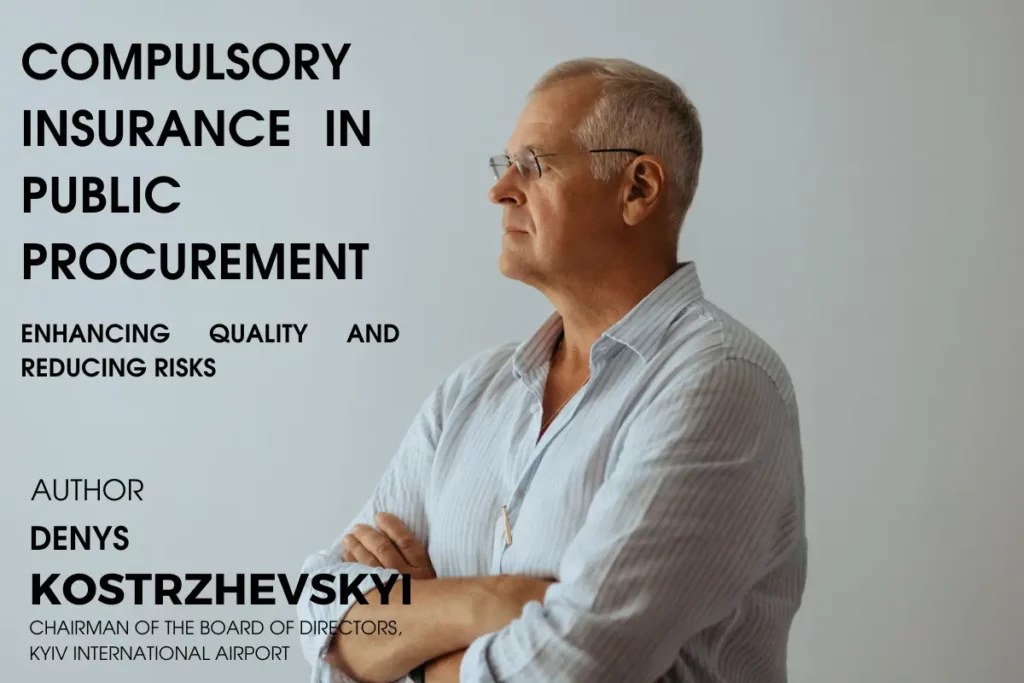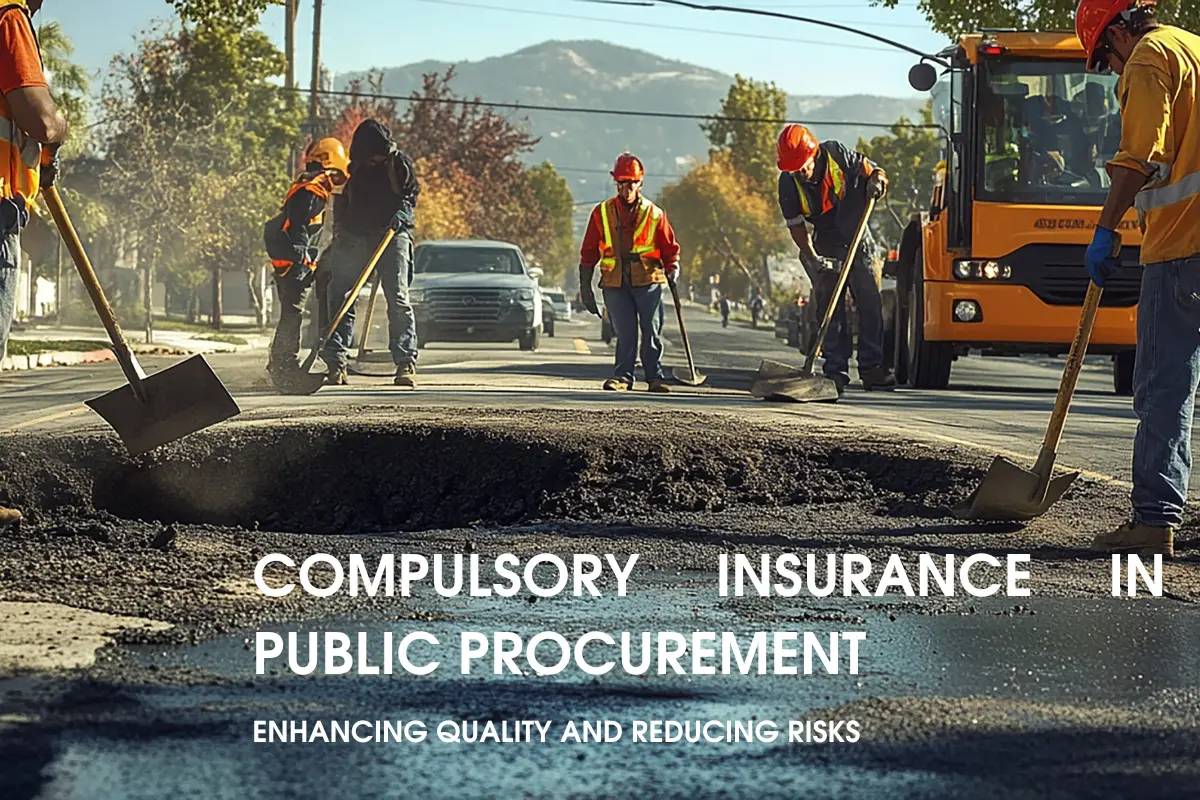Insurance in Public Procurement Is Not a Formality — It Is a Weapon Against Corruption
Denys Kostrzhevskyi, Chair of the Board, Kyiv International Airport; expert in public-private partnerships
In today’s Ukraine, insurance is treated not as a tool of accountability but as a mere box-ticking exercise. It protects neither the state nor the taxpayer. Used properly, it could already have saved billions of hryvnias and dismantled countless corruption schemes.
According to the National Commission for Financial Services, in 2022 the total gross insurance premiums in Ukraine fell to ₴39.6 billion — roughly €990 million — down 8 per cent in non-life insurance and 17 per cent in life insurance.
For comparison, Poland’s figure for the same period was €15.4 billion, and Romania’s €2.36 billion. Strikingly, almost half — 49 per cent — of all Ukrainian insurance premiums come from motor insurance, revealing how dependent the market is on compulsory, rather than economically rational, products.
“Our insurance market is like a child that was never taught. And this neglect costs us billions.”
— Denys Kostrzhevskyi
This under-development is not merely a consequence of the war. It reflects a lack of insurance culture and of legislative frameworks that would oblige its use where it is most needed — in public procurement. Without it, the state continues to pay twice, while corruption proves immune even to electronic tendering.

The Insurer as an Independent Watchdog
Forget the so-called inspectors who “overlook” irregularities. A properly involved insurer is a stakeholder with skin in the game: it refuses to let a contractor cut corners, because it would bear the cost of failure.
This changes the dynamic entirely. By issuing a policy for a public contract, the insurer effectively guarantees quality. Long before the tender is awarded, it assesses the contractor: their track record, financial stability and technical compliance.
During project delivery, the insurer may send its own experts to the site — not out of curiosity, but because it does not want to pay for premature repairs later. If something goes wrong, the insurer reimburses the state and then seeks recovery from the contractor. The risk is shifted away from the public purse and the system becomes fairer.
Most importantly, the insurer is not subordinate to local officials or political interests. Its sole motivation is to avoid a pay-out — and that makes it one of the most effective anti-corruption instruments available in procurement.
A Practical Illustration: Saving Millions by Preventing Low-Grade Supply
Consider a typical scenario. Ukrainian Railways tenders for new rails. The winner offers the lowest price — often an intermediary sourcing sub-standard steel from abroad.
A year later cracks appear, trains slow down, sometimes derail. The supplier has already dissolved; the “warranty does not apply”.
The state pays millions more for emergency repairs; passengers suffer disruption and risk.
This is a textbook corruption pattern: win cheaply, supply poor-quality goods, vanish.
Mandatory insurance breaks this cycle.
Had the contract been insured, the underwriter would have demanded certificates of steel quality, a record of previous deliveries, and a five-year-plus guarantee before issuing the policy.
It could have monitored storage conditions during delivery to prevent corrosion, required proof of load-bearing tests after installation.
If the rails wore out prematurely, the insurer would have paid for replacements and then sued the supplier.
The contractor could not have simply disappeared. To stay in business, it would have had to meet proper standards — or be excluded altogether.
This is not theory; it is precisely how such contracts are handled in much of Europe.
Legislation Must Compel a Level Playing Field
Without statutory change, all this remains rhetoric. We do not need “recommendations”; we need legal obligation to insure every contract funded by taxpayers’ money.
This is not bureaucracy — it is a safeguard.
The first step should be a National Strategy for the Development of the Insurance Market, explicitly defining the role of insurance in public procurement.
Next, the law must require mandatory insurance for all state- and locally-funded contracts, especially in infrastructure.
Statutes must set clear standards for insurers: minimum capital, proven expertise, the ability to conduct technical assessments.
There must be penalties: any contractor that signs a public contract without valid cover should see the contract voided and be barred from tenders for three years.
This may sound severe, but such rules stop corruption at the gate. The insurer becomes the “entry filter”, refusing to admit an unreliable participant even if a member of the tender board wants to “push them through”.
Why It Will Work
This is no untested hypothesis. It is a proven mechanism in dozens of countries.
It turns insurance from a cost into an investment in quality.
And crucially, it disrupts corrupt chains by introducing an actor who is neither bribable nor beholden to political interests.
The insurer is motivated to ensure the work is done properly — because it pays if it is not.
That means the contractor cannot cut corners on materials, deliver shoddy work or disappear after cashing the cheque.
Quality improves: every weld, every cubic metre of concrete is vouched for by a company risking its own money.
Budgets save: instead of three repairs in five years, there is one — but reliable. The savings run into billions.
Public trust grows: when trains stay on track and bridges do not crumble after the first downpour, citizens see that the state serves them, not private pockets.
Reducing corruption risk is therefore a core benefit of mandatory insurance.
The fight against corruption in procurement will not be won by electronic platforms alone; it requires a new framework of accountability.
Insurance is not an optional extra. It is the missing keystone of the system.
We have already wasted too much time.
Every day of delay means more cracked roads, unsafe bridges, ageing trains.
Legislators, insurers, business — the time to act together is now.
Insurance must become the mechanism that forces every contractor to think not about how to evade the rules, but about how to deliver quality — or else be excluded.
Only then will we build a state where infrastructure serves the people, not corruption.
Denys Kostrzhevskyi is Chair of the Board of Kyiv International Airport and an expert in public-private partnerships.
